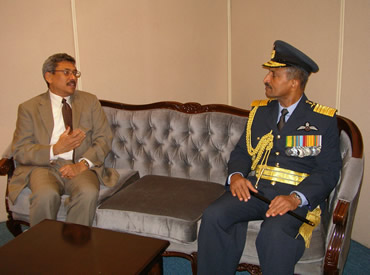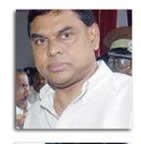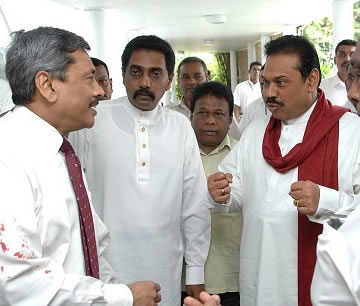Triumvir Rajas
by Sachi Sri Kantha, November 29, 2006
|
In principle, Mahinda Rajapaksa is the nominal elected President. But, in practice, he shares his power with his two siblings, Basil Rajapaksa (in charge of political affairs) and Gothabaya Rajapaksa (in charge of military affairs). This was neither divulged in President Mahinda’s election manifesto, nor overtly expected by the Sinhalese voters. To borrow Thomas Carlyle’s eloquent sentence for the Colombo scene, in November 2006, “Basil is standing motionless, Gothabaya ejaculating, Mahinda is struggling to speak”.
|
Now that the presidency of Mahinda Rajapaksa has passed its one year mark, it's time to do a reality check. For this purpose, I read his Presidential Election Manifesto entitled, ‘Victory for Sri Lanka: Mahinda Chintana – Presidential Election 2005’. My conclusion concerning his one year track record is presented in the above two-word title: ‘Triumvir Rajas’. Sure, these two keywords do not appear in President Rajapaksa’s 2005 election manifesto.
Triumvirate in History
According to the Oxford English Dictionary, the word ‘triumvir’ has the following two connotations:
(1) Usually in plural ‘triumviri’ [Roman History]. One of the three magistrates or public officers forming a committee charged with one of the departments of the administration; a member of the coalition of Pompey, Caesar and Crassus, 60 B.C. [first triumvirate]; the administration of Caesar, Antony and Lepidus, 43 B.C. [second triumvirate]/
(2) Transferred and figurative plural: Three persons (or things) associated in power or authority. In French Revolution period: Robespierre, Couthon and Saint Just. [in the words of Carlyle (1837), on French Revolution, III, “Saint Just is standing motionless, Couthon ejaculating, Robespierre is struggling to speak.”].

Defense Secretary Gothabaya Rajapakse & Air Chief Marshall Donald Perera, new Chief of Defense Staff, July 12, 2006 |
Now, let me transfer the scene to Colombo. What has not been stated in the Mahinda Chintana manifesto, has been put into practice by the current President of Sri Lanka. If one has to correctly record the past one year of political leadership, the most apt phrase is ‘triumvir Rajas’ – the Rajapaksa siblings. In principle, Mahinda Rajapaksa is the nominal elected President. But, in practice, he shares his power with his two siblings, Basil Rajapaksa (in charge of political affairs) and Gothabaya Rajapaksa (in charge of military affairs). This was neither divulged in President Mahinda’s election manifesto, nor overtly expected by the Sinhalese voters. To borrow Thomas Carlyle’s eloquent sentence for the Colombo scene, in November 2006, “Basil is standing motionless, Gothabaya ejaculating, Mahinda is struggling to speak”.
The Gothabaya siblings’ ascendancy

Basil Rajapakse, August 2006 |
The perfect evidence for the Gothabaya siblings’ ascendancy in the articulation of power is vividly noticeable in the following two news reports.
Sunil Jayasiri, in his regular opinion column, entitled “What will Prabhakaran say this time?”, to the Colombo Daily Mirror, stated the following, under the subheading, ‘President’s dilemma on Army Chief’s extension’:
“President Mahinda Rajapakse is under pressure over the issue of extension to Army Chief Sarath Fonseka, as the President had reportedly received a long letter from majority of senior Army officers – Majors General and Brigadiers – urging him not to grant an extension to the incumbent army chief. The ongoing extension period of the Army Commander is due to expire on December 18.
It is learnt that the letter by the high ranking officers had given full details of personnel information of the current army chief in order to prove as to why the extension should not be granted. The signatories to the letter had warned that hundreds of senior experienced officers would leave the Army if the President grants another extension to Lt.General Fonseka, who became the Army Chief in November last year.
Few weeks ago Defence Secretary Gothabaya Rajapaksa has recommended a one year’s extension for Fonseka but President Rajapaksa is yet to place his signature to approve the recommendation. According to sources the President has already come under heavy pressure from various sections including diplomats and confidantes not to give an extension to Lieutenant General Fonseka this time.
Lieutenant General Fonseka who survived an LTTE suicide attempt last April was in the middle of a controversy by the time of the attack for recommending irregular transfers and several senior army officers left the force due to this.” [Colombo Daily Mirror, November 24, 2006]
What a dilemma for an affable, country bumpkin-grade President, who serves as the divided island’s C-in-C, but is dependent on his sibling Gothabaya, with his past military background, to decide on the unpopular Army Chief of Sri Lanka! O Lord Buddha! What can one think about the Sri Lankan army morale? Is it your design that you have made the current Army Chief as so unpopular among his ranks, that the President of the island has been served with a sort of mutiny letter by the “majority of senior Army officers – Majors General and Brigadiers – urging him not to grant extension to the incumbent army chief.”
The following day, an unsigned short news report appeared in the same Colombo Daily Mirror under the caption with a question mark, “Army Chief’s service extended?”. To quote,
“President Mahinda Rajapaksa has reportedly decided to extend the service of Army Commander Sarath Fonseka whose term is due to expire on December 18. However attempts by the Daily Mirror to confirm the move did not prove fruitful at the time of going to press.
Informed sources said President Rajapaksa had placed his signature on the document after going through the details of the Commander. Earlier Defence Secretary Gothabaya Rajapaksa had recommended one year’s extension to Commander Fonseka.
According to sources the President had come under heavy pressure from various sections including diplomats and confidants not to extend the service of General Fonseka whose term had already been extended previously as well.” [Colombo Daily Mirror, Nov.25, 2006]
While President Mahinda dances to the tune set by his sibling Gothabaya in the military affairs of the rump Sri Lanka, according to Colombo’s news analysts presenting their unsigned opinions in the Colombo Daily Mirror and Sunday Leader, the other Presidential sibling Basil Rajapaksa works on the political affairs agenda. Basil Rajapaksa’s primary agenda has been nothing profound. He has been vigorously involved in a political ‘dog-catching’ job - inducing political prey from the opponent’s camp (mainly the UNP), with saliva-stimulating Cabinet minister positions.
Some Loafing in Job Time
It is my view, based on ground level input from a contact living in Colombo, that President Mahinda is just loafing in his job time. And he (like his predecessor, Chandrika Kumaratunga) was accustomed to this loafing mode, immediately after his teenage schooling phase. When I perused his bio-data, I noticed his loafing phase for nearly 6 years (which coincidentally is the presidential term of office in Sri Lanka). This has been somewhat pushed under the rug by his loyal bag carriers. Here is President Rajapaksa’s “education/early life”, as culled from his official website [www.presidentsl.org]
“Born in Weeraketiya in the deep south, November 18, 1945, Rajapaksa schooled at Richmond College, Galle, later shifting to Nalanda College and Thurston College, Colombo. In 1974 he passed out as an Attorney-at-Law from the Colombo Law College and took his place at the bar, with a special interest in human rights.”
Let me calculate. Born in 1945, Mahinda would have completed his schooling at the age of 18 years at Thurston College. That would have been in 1963. Mahinda became the youngest elected MP in the 1970 general election, winning the Beliatta constituency for the SLFP, which was represented by his father in the Ceylonese parliament from 1947 to 1965. What did Mahinda Rajapaksa do between 1963 and 1970? This gap has been left unmentioned.
Political triumvirates are doomed in history
The past history of political triumvirates in world history does not provide confidence for the success of the current Triumvir Rajas of Sri Lanka. If Mahinda Rajapaksa, his cronies and advisors are interested in knowing, here follows a synopsis.
The First Triumvirate (60 - 53 B.C): established by Julius Caesar (100-44 BC), Pompey (106-48 BC) and Crassus (115-53 BC). Crassus was decapitated following a defeat in the Battle of Carrhae. Then, Casesar defeated Pompey in 48 BC, when the latter was assassinated. Caesar, while establishing himself as a dictator, fell for an assassination plot masterminded by Cassius and Brutus in 44 BC.
The Second Triumvirate (43 – 36 BC): established by Mark Antony (82-30 BC), Octavius (later Augustus) Caesar (63 BC – AD 14), and Emilius Lepidus (? – 13 BC). Lepidus was deposed in 36 BC, by Octavius Caesar stripped Lepidus all offices. Mark Antony committed suicide in 30 BC. Then, Octavius Caesar reigned as the first Roman emperor as Augustus Caesar until AD 14.
Triumvirate of the French Revolution: Maximilian Robespierre (1758-1794), Georges Auguste Couthon (1755-1794) and Louis de Saint-Just (1767-1794). Robespierre, Couthon and Saint Just held power during the ‘Reign of Terror’, which spanned from Sept.5, 1793 to July 28, 1794, during which 18,500-40,000 people lost their lives. All three were guillotined.
Triumvirate in Soviet Union: This triumvirate leadership of Nikita Khrushchev (1894-1971), Lavrenti Beria (1899-1953) and Georgy Malenkov (1902-1988) succeeded Stalin’s death in March 1953. The first to fall was Beria, who was secretly executed for treason in Dec.23, 1953. Then, Malenkov (who was holding the titular position of Soviet prime minister) was replaced in 1955, followed by expulsion from the Presidium in 1957, accused of forming an ‘antiparty’ group. Khrushchev assumed sole power in 1958, but he in turn was pushed out in 1964 by a coterie led by Leonid Brezhnev (1907-1982).
Bonapartism and not Democracy

Gothabaya Rajapakse & Mahinda Rajapakse, December 1, 2006 |
‘Bonapartism’ is the political term coined to identify support of the claim of some member of the family to rule. This is derived from 19th century French history, in reference to the government established by Louis Bonaparte, aka Napoleon III (1808-1873). Despite the textbook cliché that democracy prevails in Sri Lanka, the history of the SLFP (or for that matter, the UNP) has been nothing but the tracing and retracing of the Bonapartism dogma. Why? This fits well with the island’s monarchic traditions, which predated the five centuries of colonial rule.
Bonapartism in SLFP emerged in 1960 to promote the sobbing widow of the assassinated prime minister Solomon Dias Bandaranaike to the throne. In 1994, Chandrika Kumaratunga again climbed to success on the pillars of Bonapartism, as the daughter of two prime ministers. The claim of Mahinda Rajapaksa to the political throne was also based on Bonapartism from his loyal father, D.A.Rajapaksa, who himself crossed over with Solomon Dias Bandaranaike in 1951 from the UNP to form the SLFP.
In this context, the thoughts of a correspondent named Oscar E.V. Fernando, published a few months ago, are somewhat revealing on the bankruptcy of the policies of Bonapartist Triumvir Rajas. To quote,
“Today in Sri Lanka one wonders as to who governs. Is it the president, president and parliament, the parliament, president and part of the government or the president and courtiers or close associates? Who decided on Mavil Aru war – it was certainly not the parliament in Emergency session? How could it be parliament when the government is fishing for a clear majority? Can the country be run with a silent legislature?
Which way would the president turn to – Is it to pull the government and the cart of the economy tied to a donkey and a bull, or will it be a carriage tied to two sturdy horses? Until this decision is made the country is drifting with an additional load of a war in a stagnant cart that is likely to be pulled in different directions by the donkey/bull duo.” [‘Democracy in the island of Sri Lanka’, Colombo Daily Mirror, Aug.21, 2006]
Well said, Mr.Oscar Fernando. Let's wait and see what is going to happen to the Triumvir Rajas.
|  Home
Home Archives
Archives Home
Home Archives
Archives